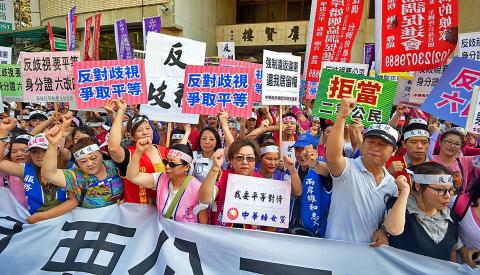The waiting period for Chinese spouses to become eligible for Taiwanese identity papers should be cut to four years from the current six years, the Chinese Nationalist Party (KMT) said yesterday.
In a statement released hours after hundreds of Chinese spouses protested outside the Legislative Yuan in Taipei to call for a reduction in the statutory waiting period, KMT Culture and Communications Committee director Chow Chi-wai (周志偉) said spouses from China should receive the same treatment afforded to those from other countries.
“They are all new inhabitants and new Taiwanese and should therefore be allowed to enjoy the same treatment, rather than being subjected to discrimination and differentiated treatment,” Chow said.

Photo: Lo Pei-der, Taipei Times
Citing statistics compiled by the Ministry of the Interior’s National Immigration Agency, Chow said that as of April, the number of Chinese spouses in Taiwan reached 331,899, accounting for about two-thirds of all foreign spouses living in Taiwan.
“This large group of people should be valued and taken care of by the government,” Chow said. “Instead, they have been facing rules far more stringent than those imposed on spouses from other countries for the application of Taiwanese identity cards.”
Chow said such regulations are unreasonable and discriminatory.
According to the Act Governing Relations Between the People of the Taiwan Area and the Mainland Area (臺灣地區與大陸地區人民關係條例), Chinese spouses must wait for six years before they can obtain a Taiwanese identity card, down from eight years in 2009.
However, for immigrant spouses from other countries, they are permitted to apply for Taiwanese identity papers after four years of residency under the Nationality Act (國籍法) and the Immigration Act (入出國及移民法).
Chow said President Tsai Ing-wen (蔡英文) recently shared a Facebook post by KMT Chairman Hung Hsiu-chu (洪秀柱), calling for an immediate end to discrimination against ethnic groups.
Urging the Democratic Progressive Party (DPP) to open its heart and embrace Taiwan’s new residents, Chow said the party should support the KMT caucus’ draft amendment to Article 17 of the Act Governing Relations Between the People of the Taiwan Area and the Mainland Area to cut the waiting period for Chinese spouses to four years.
Separately yesterday, the KMT’s Central Standing Committee approved the nomination of Adimmune Corp (國光生技) chairman Steve Chan (詹啟賢) to be a party vice chairman.
Chan, who graduated from the Chung Shan Medical University, has previously served as a Presidential Office senior adviser, KMT deputy secretary-general, the Republic of China’s ambassador-at-large, and superintendent of the Chi Mei Medical Center.
Chan is the fourth KMT vice chairman nominated by Hung, after the designation of former Taichung mayor Jason Hu (胡志強), former Taipei mayor Hau Lung-bin (郝龍斌) and Minister Without Portfolio Lin Jung-tzer (林政則) last month.

Taiwan has received more than US$70 million in royalties as of the end of last year from developing the F-16V jet as countries worldwide purchase or upgrade to this popular model, government and military officials said on Saturday. Taiwan funded the development of the F-16V jet and ended up the sole investor as other countries withdrew from the program. Now the F-16V is increasingly popular and countries must pay Taiwan a percentage in royalties when they purchase new F-16V aircraft or upgrade older F-16 models. The next five years are expected to be the peak for these royalties, with Taiwan potentially earning

STAY IN YOUR LANE: As the US and Israel attack Iran, the ministry has warned China not to overstep by including Taiwanese citizens in its evacuation orders The Ministry of Foreign Affairs (MOFA) yesterday rebuked a statement by China’s embassy in Israel that it would evacuate Taiwanese holders of Chinese travel documents from Israel amid the latter’s escalating conflict with Iran. Tensions have risen across the Middle East in the wake of US and Israeli airstrikes on Iran beginning Saturday. China subsequently issued an evacuation notice for its citizens. In a news release, the Chinese embassy in Israel said holders of “Taiwan compatriot permits (台胞證)” issued to Taiwanese nationals by Chinese authorities for travel to China — could register for evacuation to Egypt. In Taipei, the ministry yesterday said Taiwan

Taiwan is awaiting official notification from the US regarding the status of the Agreement on Reciprocal Trade (ART) after the US Supreme Court ruled US President Donald Trump's global tariffs unconstitutional. Speaking to reporters before a legislative hearing today, Premier Cho Jung-tai (卓榮泰) said that Taiwan's negotiation team remains focused on ensuring that the bilateral trade deal remains intact despite the legal challenge to Trump's tariff policy. "The US has pledged to notify its trade partners once the subsequent administrative and legal processes are finalized, and that certainly includes Taiwan," Cho said when asked about opposition parties’ doubts that the ART was

If China chose to invade Taiwan tomorrow, it would only have to sever three undersea fiber-optic cable clusters to cause a data blackout, Jason Hsu (許毓仁), a senior fellow at the Hudson Institute and former Chinese Nationalist Party (KMT) legislator, told a US security panel yesterday. In a Taiwan contingency, cable disruption would be one of the earliest preinvasion actions and the signal that escalation had begun, he said, adding that Taiwan’s current cable repair capabilities are insufficient. The US-China Economic and Security Review Commission (USCC) yesterday held a hearing on US-China Competition Under the Sea, with Hsu speaking on